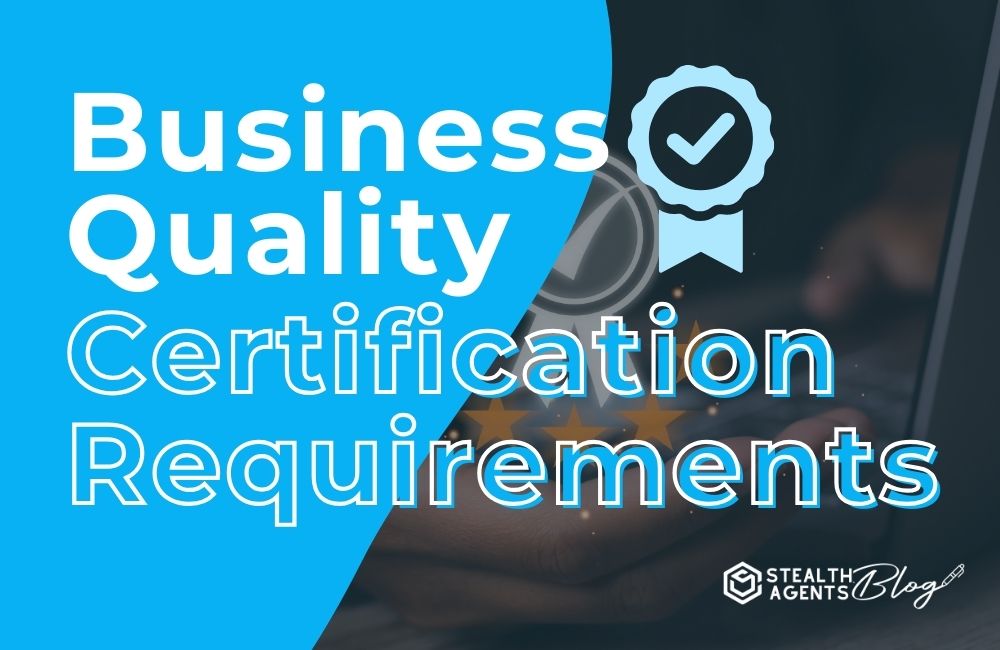Navigating the Sea of Quality Certifications: What Your Business Needs to Know
In the competitive ocean of global commerce, quality certifications are your ship’s compass, guiding you toward the shores of reliability, trust, and operational excellence. Whether you’re a seasoned business owner or a plucky start-up charting new waters, understanding the beacons of quality certification is paramount in optimizing your business for success.
Certifications like ISO standards and industry-specific seals of quality not only bolster your credibility but also serve as passports to new markets. However, the waters of certification can be deep and murky, filled with complex regulations and audits. Fear not, for we are here to serve as your navigational guide, illuminating the path to obtaining and maintaining these critical endorsements.
Join us as we explore the importance of quality certifications, types of certifications available, the substantial benefits they offer, the nitty-gritty of requirements, and how to sail the sea of certification costs. By the end, you’ll be well-equipped to set sail on your certification voyage with confidence.
Importance of Quality Certification in Business
Navigating the labyrinthine marketplace can leave customers and clients shipwrecked amidst a sea of dubious products and services. Quality certification stands as your beacon, broadcasting the message that you are a business committed to excellence, safety, and the environment.
Consider this: in a survey of global consumers, 66% said they were willing to pay more for sustainable brands. The numbers tell a clear story. Certification isn’t just about what you sell; it’s a powerful narrative about how you do business.
A glance at the global giants of commerce shows that quality is not merely a luxury but a cornerstone of sustainable growth. As a testament to its essence, we need only look at ISO-certified companies like Toyota and 3M, renowned for their quality-driven culture and efficiency.
Types of Quality Certifications
The world of business quality certifications resembles a vibrant ecosystem, teeming with various species. Here we highlight two of the most prominent classes:
*advertisement*
Tired & Overwhelmed With Administrative Tasks?
Hire A Top 1% Virtual Assistant From Stealth Agents!

Sign Up Below & Hire A Top 1% Virtual Assistant
Rated 4.7 Stars Serving Over 2,000+ Customers.
Hire Top 1% Virtual Assistants For $10-$15 Per Hour
Ask About Our 14 Day Trial!
*advertisement*
ISO Standards
ISO (International Organization for Standardization) certifications lay out the benchmarks for what constitutes best practices in a multitude of areas: from quality management (ISO 9001) to environmental friendliness (ISO 14001). Achieving ISO certification is a hallmark of organizational maturity and continuous improvement.
Industry-Specific Certifications
Certain industries, like healthcare and food services, maintain rigorous standards necessitating specialized certifications. For example, the medical field leans on ISO 13485, a quality management standard for medical devices, ensuring the utmost precision and patient safety.
Benefits of Quality Certifications
The swathe of benefits that unfurls from being quality-certified is as vast as the ocean itself. Here, we dip our toe in some of the most compelling advantages:
Enhanced Credibility
Certification isn’t merely a rubber stamp—it’s a public declaration of your commitment to meeting and exceeding industry-acknowledged best practices. It evokes trust from customers and community alike, cementing your reputation as a reliable and responsible outfit.
Improved Quality Control
Maintaining a certain standard isn’t just about an outward reputation; it significantly impacts your internal operations. Quality certifications foster a culture of meticulousness, where every process and product is scrutinized and improved, leading to operational efficiency and financial savings.
Access to New Markets
Some markets are fortified by regulatory barriers that only open their gates to certified enterprises. Once you’ve earned your certification, you can set sail into uncharted territories, expanding your reach and revenue opportunities.
Requirements for Certification
The certificate you receive is a public acknowledgment of a complex process completed behind the scenes. Here are the three intricately woven threads of the certification fabric:
Documentation
Your first mate on the certification voyage will be exhaustive documentation. From policies and procedures to process maps and records, each element must be detailed and readily accessible for inspection.
Process Audits
Expect your systems and processes to be turned inside out and examined with a fine-tooth comb. These audits—typically by a third-party certification body—are not mere formalities. They are in-depth dives to ensure that every letter of your documented procedures is manifested in practice.
Training and Compliance
For the lighthouse of certification to be upheld, every member of your crew must understand and adhere to the principles and practices set forth. Ongoing training and compliance checks will be vital in ensuring that the culture and operations of your business remain aligned with the standards.
Choosing the Right Certification
Selecting the ideal certification for your business can be akin to selecting the right vessel for a particular voyage. Some guiding lights:
Matching Certification to Business Needs
Each certification serves a particular function, and not all functions may be applicable to your industry or growth strategy. Assess your operations and aspirations to select a certification that’s not just prestigious, but practical.
Cost Considerations
Certification comes with costs: both in terms of financial investment and operational adjustment. Weigh the potential benefits against the incurred expenses to ensure that the certification course you chart is a lucrative one.
Conclusion: Sailing the Seas of Quality Certification
In the end, quality certifications are not just about meeting a standard; they’re about setting sail on a commitment to continual growth and consumer-centric operations. They help businesses not only survive but thrive, becoming part of a network of excellence that enriches the whole marketplace.
By embracing the certification standards that speak to the heart of your business, you’re not only navigating the market — you’re guiding it to a better, more sustainable future. With attention to detail, investment in training, and a clear view of the horizon of possibilities, your business can set sail on the certification seas with confidence and purpose.
For those businesses ready to broaden their horizons and set a course for new opportunities, quality certifications are the chart and the compass. It’s time to cast off, safe in the knowledge that your buyers and partners will see your flag flying high above the turbulent waves of the marketplace.
In the grand narrative of commerce, quality certifications are not just regulatory or accreditation benchmarks. They are the stories we tell about our commitment to our craft, to our customers, and to the collective tapestry of global business. Set your narrative in motion today.










